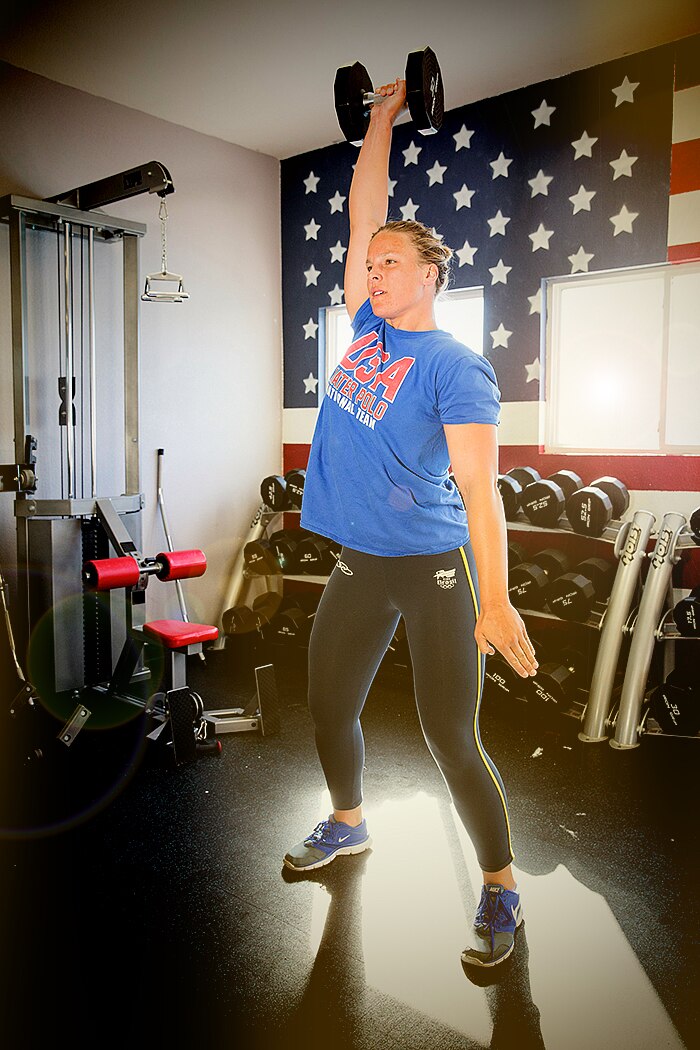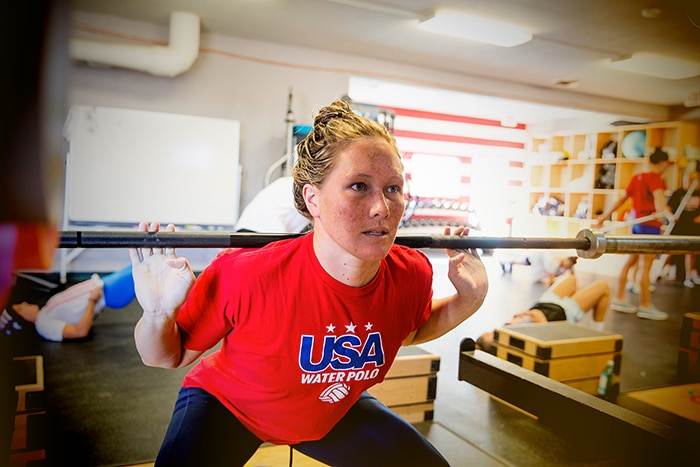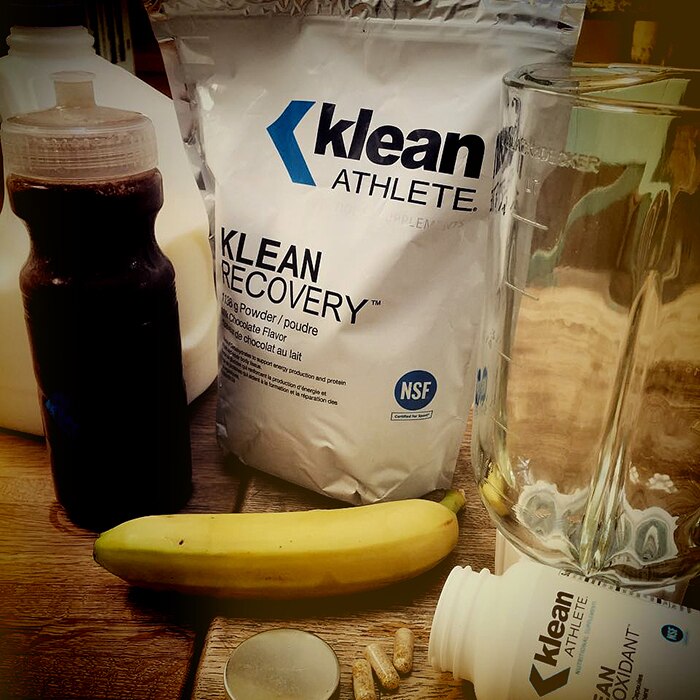Power Up with Protein: Protein Nutrition for Strength and Power Athletes
Blog by Karlyn Grimes, MS RD LDN CSSD
Retained Medical Adviser (biography click here)
The following is the second of a multi-part series on nutrition for strength and power athletes and finding the optimal recipe for peak performance.
Click here to read Part I: Strength and Power Calorie Prescription
As all strength and power athletes know, muscles love dietary protein. The protein you eat provides the structural framework for muscle growth and development. It also allows your body to form antibodies to keep your immune system humming, enzymes to help you digest food and to support metabolic pathways that promote strength, and hormones that create an anabolic (“growth”) environment for your muscles. As we challenge our bodies physically, numerous physiological processes are accelerated in an attempt to meet the greater demands, and that requires the input of additional dietary protein.

Kami Craig is a member of the Klean Athlete sponsored USA Water Polo Women’s Senior National Team, training at their facility in Orange County, CA.
Daily Protein Needs For Power
Athletes that desire to gain muscle mass or those just starting a weightlifting program need to strive for the higher end of the recommended protein range (1.5-1.7 g/kg).1 Those attempting to maintain current body weight should aim for 1.2-1.4 g/kg, reserving 1.4 g/kg for heavy training days. Dieting athletes may benefit from up to 2 g/kg to prevent muscle catabolism (breakdown). In order to preserve muscle and support additional growth, it is best to spread protein intake throughout the day. Individuals under 40 should aim to consume 20-25 grams of high-quality protein per meal, while those over 40 should consume 30-40 grams of protein at each meal. Additionally, all individuals, regardless of age, should strive for 10-15 grams of protein at afternoon and evening snacks. The addition of ~2.5 grams of the amino acid leucine has been shown to further enhance anabolism. Each scoop of Klean Isolate provides 20 grams of high-quality protein with over 2 grams of leucine per serving. Just add 10-12 ounces of your favorite beverage for a quick protein fix.

Courtney Mathewson is a member of the Klean Athlete sponsored USA Water Polo Women’s Senior National Team, training at their facility in Orange County, CA.
Think Proactively Prior to Training and Competition
When training time is close at hand, a small dose of protein has been found to prevent muscle catabolism once an intense exercise session begins. Protein-rich foods also take a bit longer to empty from the stomach than carbohydrates, so they provide a satiety effect and a more gradual delivery of nutrients to the bloodstream. This will help sustain energy levels for a longer period of time allowing for more intense and longer workouts. And most importantly, protein consumption prior to training can aid muscle protein synthesis after exercise due to its ability to enhance the pool of amino acids that promote anabolism.2
Preparing for Anabolism During Training
Once you start exercising, protein synthesis in the body halts, but consuming dietary proteins during exercise can help prevent low blood sugar (hypoglycemia) and serves as an energy source for sustained physical efforts. Whatever is left over joins the pool of amino acids waiting to be transformed into new tissue, hormones, enzymes, antibodies and other crucial building blocks when your training session is over. Make certain to limit your protein intake to ~6 to 20 grams of high-quality protein to prevent gastrointestinal upset. Also, always experiment with your perfect pre-competition protein prescription during training so there are no unpleasant surprises on game day.

Post-Training Protein Pump Up
After training or competition, protein is a key player in the repair of training-induced mini-muscle microtears and promotes new muscle protein synthesis. Additionally, foods rich in protein and carbohydrates encourage glycogen replenishment in the muscles and liver. Muscles are most receptive to protein consumption within 30 to 60 minutes post-exercise (the “anabolic window”), but will continue to utilize amino acids over the course of 24 hours. Strive for regular mini-doses of protein in the post-workout period and beyond to minimize protein breakdown. The whey protein found in Klean Isolate is an ideal choice since it is rapidly digested, contributing immediate amino acids to the anabolism process.
Use the following table to generate your own personal protein prescription:
| Your Personal Protein Prescription | ||
| Nutrient Timing | The Prescription (Rx)3 | Foods To Meet Your Protein Rx |
| Daily Protein Requirements |
|
How To Get 20 grams of Protein
|
| Pre-Training Protein |
1 to 4 hours prior to training
|
|
| Protein During Training |
|
|
| Post-Exercise Protein |
|
|

Bio
Karlyn Grimes, MS RD LDN CSSD, is the founder of Simply Simple Health (SSH) and author of The Everything Anti-Inflammation Diet Book. SSH creates and administers nutrition, fitness and health education programs for athletes, educators, coaches and sports teams at schools and colleges throughout the Boston area. Its programming includes individual and group sports nutrition counseling, as well as sport-specific personal training. SSH also contributes to numerous academic textbooks and magazines.
Karlyn has a dual Master’s degree in nutrition and exercise physiology from Boston University and a Bachelor of Arts degree in biology from Colgate University, with a minor in economics. She is a registered dietitian (RD) with the Academy of Nutrition and Dietetics, a certified specialist in Sports Dietetics (CSSD) and a licensed dietitian nutritionist (LDN) in the state of Massachusetts. She is currently a faculty member in the Nutrition and Biology Departments at Simmons College in Boston, where she teaches sports nutrition, medical nutrition therapy, exercise physiology, anatomy and physiology, general biology, and numerous other courses.
References
- Rennie MJ, Tipton KD. Protein and amino acid metabolism during and after exercise and the effects of nutrition. Annu Rev Nutr 2000; 20: 457-83.
- Tipton KD, Rasmussen BB, Miller SL, et al. Timing of amino acid-carbohydrate ingestion alters anabolic response of muscle to resistance exercise. Am J of Physiol Endocrinol Metab. 2001; 281(2): E197-206.
- Potgieter S. Sport nutrition: A review of the latest guidelines for exercise and sport nutrition from the American College of Sport Nutrition, the International Olympic Committee and the International Society for Sports Nutrition. South African Journal of Clinical Nutrition. 2013;26(1):6-16.
Topics
